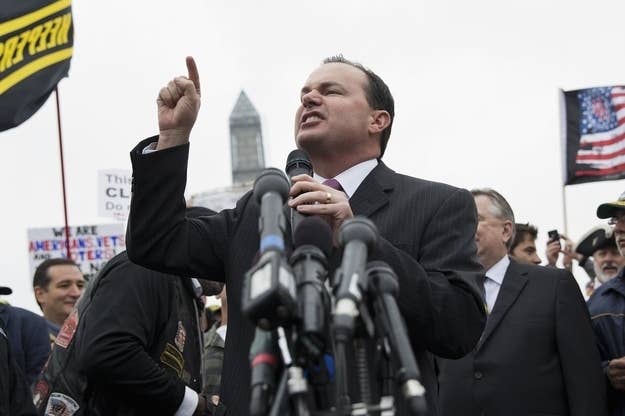
WASHINGTON — In a lofty, agenda-setting speech at the Heritage Foundation Tuesday, Sen. Mike Lee called for conservatives to cease their frenzied campaign to purge "heretics" from the GOP, and enter instead into a productive, large-scale debate over what Republicanism should look like in the 21st century.
Step one: Get wonky.
"If our generation of conservatives wants to enjoy our own defining triumph, our own 1980 — we are going to have to deserve it," the Utah senator said. "That means sharpening more pencils than knives. The kind of work it will require is neither glamorous nor fun, and sometimes it isn't even noticed. But it is necessary."
He added, "To deserve victory, conservatives have to do more than pick a fight. We have to win a debate. And to do that, we need more than just guts. We need an agenda."
If the rhetoric seems slightly misplaced coming from one of the key architects of congressional Republicans' government shutdown strategy — a crusade borne out of political bravado more than carefully considered policy — Lee didn't seem fazed.
Inviting his fellow Republicans to join in a "Great Debate" over their platform, Lee proceeded to lay out his own vision for the future of the party, a sort of compassionate conservatism 2.0 aimed at fixing the social problems that preoccupy progressives — income inequality, access to higher education, deteriorating infrastructure — with policy initiatives that the tea party can love.
He spent the bulk of his remarks making the case for new legislation that would reform the tax code to ease the burden on parents trying to raise kids, and overhaul the accreditation system to make more room in the educational landscape for online college courses and apprenticeships.
He pointed to his home state of Utah, where the Church of Jesus Christ of Latter-day Saints runs one of the largest private welfare programs in the country, as a model for conservative efforts at promoting upward mobility. And he framed his support for a new, state-supervised infrastructure program — complete with a substantial cut to the gas tax — as a way of helping parents spend more time with their kids.
"House-hunting middle-class families today often face a Catch-22," Lee said. "They can stretch their finances to near bankruptcy to afford a home close to work. Or they can choose a home in a more affordable neighborhood so far away from work that they miss soccer games, piano recitals, and family dinner while stuck in gridlocked traffic. The solution is not more government-subsidized mortgages or housing programs. A real solution involves building more roads."
Lee's brand of family-first populism has its share of cheerleaders among the GOP's smart set — New York Times columnist Ross Douthat, a religious social conservative, and Business Insider editor Josh Barro, a liberal Republican, have both expressed support for elements of the senator's agenda.
But the overarching message of Lee's remarks — the first of several speeches and interviews he plans to give in coming months on the future of conservatism, according to aides — was not simply to follow his lead. Rather, he called on conservatives to direct their energy at shaping a new agenda, rather than going to war with the Republican "establishment."
Lee argued the only way conservatives would replicate the "Reagan revolution" is by coming up with innovative new policies.
"Especially in the wake of recent controversies, many conservatives are more frustrated with the establishment than ever before. And we have every reason to be," Lee said. "But however justified, frustration is not a platform. Anger is not an agenda. And outrage, as a habit, is not even conservative."
